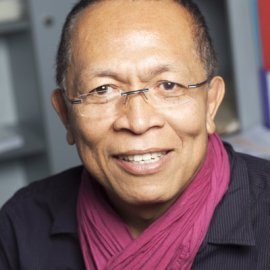Modern Political History, University of Toamasina, Madagascar

Septembre 2013 à Juin 2014
Solofo Randrianja essentially works on the contemporary political history of Madagascar. He has signed and co-signed several volumes in this fi eld of which Madagascar, a short history (Hurst, University of Chicago Press) is considered as a reference work. He particularly focuses on identities, alternative political cultures and autochthony. He has taught at the University of Chicago and was a fellow the “Africa Studie Centrum” of Leiden and at the Taiwan Foundation for Democracy. He is now Director of research at the Political Studies Institute of Madagascar where he is in charge of the Governance and Development laboratory and of the doctoral school. He is co-editor in chief of the CODESRIA (Council for the Development of Social Science Research in Africa) Identity, culture and politics magazine. He is Professor at the Department of History of the University of Toamasina. In 2000 at Nashville (Tennessee, USA) he was awarded
the International Visitor Award by the African Studies Association (ASA) for his researches. His duties have given him the opportunity to work with several research centres such as Freedom House, Global Integrity and Varieties of democracy.
He is currently working on local and autochthonous forms of democracy.
Slavery, sanskritisation and contemporary history of Madagascar
Taking into account the diversity and fluidity of the groups of dependents within a more global system, the project intends to question the existence, in a context of conflict, of an autonomy
of the memory for the dependent groups. Even though this memory is expressed and passed on verbally, it is no less the source of numerous interrogations.
Does this memory autonomously emerge thanks to the idioms, the standards and the values enrooted in the experiment of labour and social exploitation? What are the transmission
channels of this memory? In this context, what is the status of orality in particular in the conflicts of memory which oppose the present actors in practical problems such as conflicts over lands?
Two groups of slave descents, the Marofotsy (central northern Madagascar) and the Miangorandrana (in the suburb of Toamasina, east coast), which appeared at the beginning
of the nineteenth century under the reign of the King Radama I (1810-1828) will be used as main fields of observation. The project does not aim to reconstitute the history of the dependence
in which however the respective trajectory of the two groups is evolving. But these trajectories produce narratives which are constantly reactualized. Their analysis will make it possible to evaluate the relevance of the “subalternist” project on the autonomy of the subaltern groups’ memory.